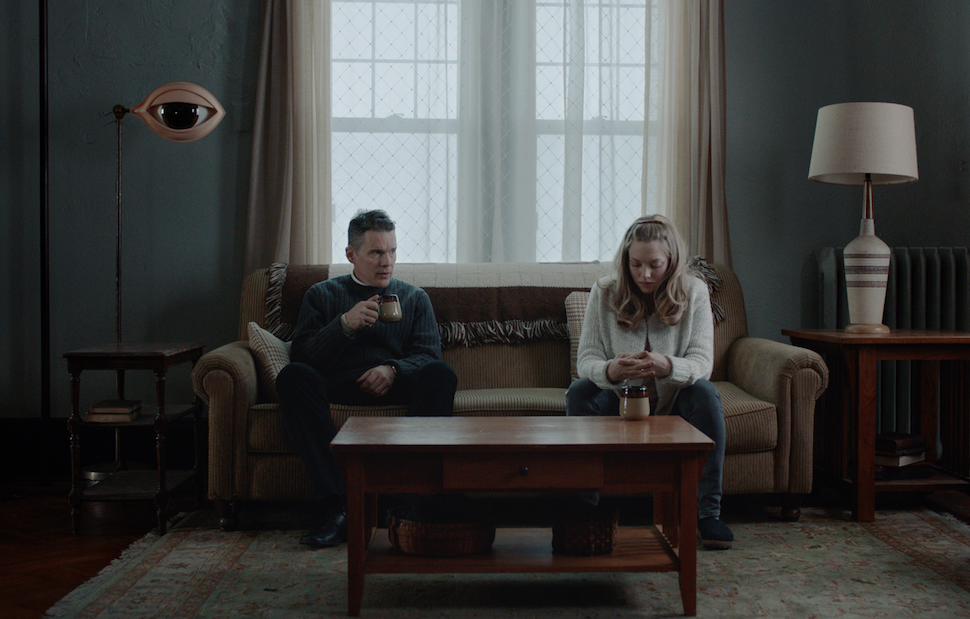First Reformed
First Reformed, 2017, 4 ¼ stars
Taxi Driver revisited
First Reformed is spiritual sequel to Scorsese classic
From The Orlando Weekly, June 6, 2018
Travis Bickle and Ernst Toller are cinematically simpatico. Toller (Ethan Hawke) is a reverend of a small church in rural New York, and Bickle (Robert De Niro) is the titular taxi driver in urban New York in Martin Scorsese’s 1976 classic, so, admittedly, they are surface opposites. But both are haunted, ex-military men, increasingly isolated and searching for meaning. And both are born of Paul Schrader.
Raised by a strict Calvinist family, Schrader wasn’t allowed to watch movies as a child. He certainly made up for lost time, as he wrote Taxi Driver before he was 30. Though First Reformed could be viewed as a sort of spiritual sequel to that earlier work, religion informs most of Schrader’s material, including, of course, The Last Temptation of Christ (also directed by Scorsese). But even Taxi Driver is a spiritual movie and, like First Reformed (and even Raging Bull, another Schrader-Scorsese collaboration), focuses like a laser on the evolution of a man’s soul.
Toller (Ethan Hawke), a former military chaplain who lost both his son and marriage to the Iraq War, heads the First Reformed Church of Snowbridge, New York. Though he’s passionate about his parish and its upcoming 250th anniversary, he has little control of it, as it’s managed by a much larger church. Led by small-minded Reverend Jeffers (Cedric the Entertainer), that mega-ministry is beholden to big business and has seemingly lost sight of its godly mission. Though Jeffers tells Toller that he’s just a “minister at a tourist church that no one attends,” Toller is determined to do right, and that determination grows even more intense after a life-changing encounter with an emotionally troubled environmentalist who exposes Toller’s inner Bickle.
Schrader’s writing is as sharp as ever. Directorially, he’s no Scorsese, but he makes some intriguing choices, such as shooting in the old aspect ratio of 1.37:1 and eschewing camera movement. This lends the film a still, meditative air and removes stylistic distractions, except for a couple of moments of whimsy. (One is reminiscent of Taxi Driver.) For Schrader, ideas are paramount, and he packs in plenty, none less profound than the proposition that, to survive, we must hold hope and despair in our minds simultaneously.
Hawke gives a quiet yet assured performance as both protagonist and part-time narrator, and is already generating Oscar buzz. (One is reminded of Montgomery Clift in Alfred Hitchcock’s I Confess.) As the wife of the aforementioned environmentalist, Amanda Seyfried exudes sweet sympathy but lacks Hawke’s dramatic gravitas. As said environmental activist, Philip Ettinger is memorable, but the most interesting casting choice is Cedric the Entertainer as Jeffers. If Toller is spiritually “always in the garden,” Jeffers is eternally in the temple, hanging with the money-changers and merchants. And his insinuation that environmental cataclysm wouldn’t necessarily be bad – because God allowed Earth’s destruction during the Great Flood – is staggeringly frightening.
Distraught over our reprehensible stewardship of our planet and repulsed that big religion is culpable, Toller poses the film’s central question: “Will God forgive us?” That seems unlikely.
© 2018 Orlando Weekly / MeierMovies, LLC
